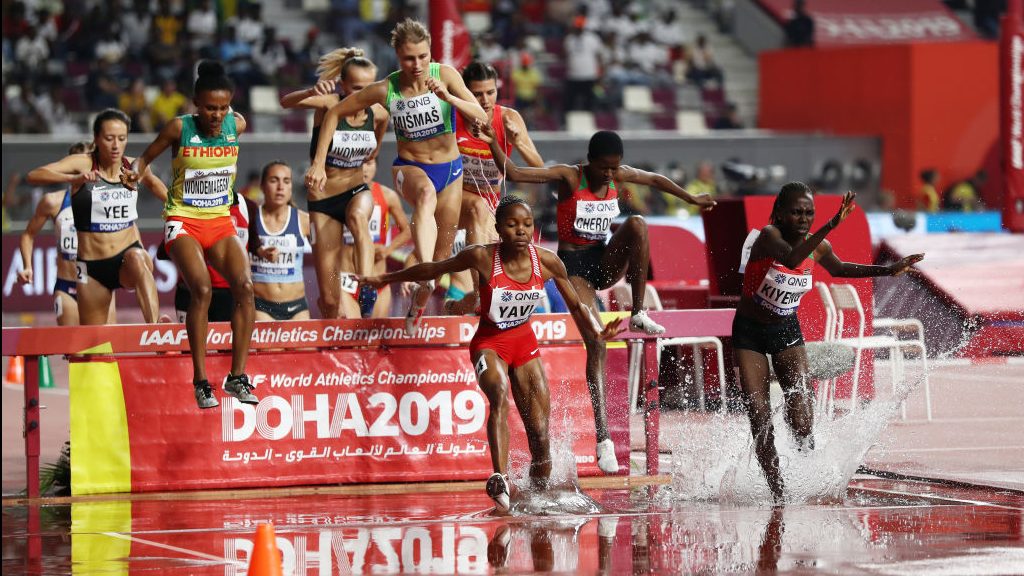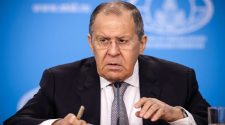Immediately after Christian Coleman sped through the finish line with the fastest 100m of his life, in the biggest race of his life, he let out a roar of at least three seconds. He slapped his chest, again and again, as is required of sprint kings. He came to a stop and yelled at the cameras, “Don’t play with me!”
Coleman had just cemented himself as the world’s fastest active man with his world championships victory in 9.76 seconds, becoming the sixth-fastest in history.
He ran away from countryman Justin Gatlin, who is 14 years older at 37, and won by .13, matching the largest margin of victory of Usain Bolt‘s three world titles. Canadian Andre De Grasse took bronze at 9.90 in Doha.
Coleman may not be as well-known as the Olympic medalists Gatlin and De Grasse, the two closest to Bolt in Rio. But he actually has been No. 1 on the fastest times lists for three years running, building Bolt-like momentum (if not Bolt-like times, yet) going into the Olympic year.
TRACK WORLDS: Results | TV Schedule
Coleman will tell you it has not been nearly as smooth as the recent statistics show — personal bests of 9.82 seconds in 2017, 9.79 in 2018 and 9.76 in 2019. Certainly not easy before that marvelous stretch. Not during it, either.
“I feel like I always walk around with a chip on my shoulder,” Coleman said. “The road to success is never going to be straight.”
The winding path goes back to high school 20 miles south of Atlanta.
Coleman, though listed in his yearbook as most likely to receive a Nike endorsement, was under-recruited as an undersized all-state defensive back before opting to focus on track. Coleman is listed at 5 feet, 9 inches now, eight inches below Bolt.
At the 2016 U.S. Olympic Trials, he broke 10 seconds for the first time in the semifinals. But then he went .11 slower in the final. He snuck on the Olympic team, as a rising Tennessee junior, as the last of six men in the relay pool. Had he repeated his trials semifinal time in the final, Coleman would have made the Olympic team in the individual 100m as the youngest American man to do so in 40 years. Instead, he competed only in the relay prelims in Rio. He watched the final from the stands, at first winning a silver medal through his teammates and then seeing it stricken via disqualification from a botched handoff.
Coleman returned to Knoxville and went back to work. Up until Saturday (and perhaps through it), his most buzzworthy footrace had no lanes — running a 40-yard dash in 4.12 seconds in 2017, one tenth faster than the NFL Combine record.
Later that year at the world championships, Coleman went head-to-head with Bolt for the first time and beat him, both in the semifinals and the final. An incredible feat, but one overshadowed by what happened in that 100m final in London. Coleman rocketed to the lead but did not have the stamina to win that 10-second race. He was passed by Gatlin and relegated to silver by .02 (but still better than a bronze Bolt).
After twice breaking the indoor 60m world record in early 2018, Coleman hit more bumps. First, a hamstring injury. He lost two straight races and went into his finale ranked 10th in the world for the season. Then he uncorked a 9.79 at the biggest meet of 2018, the Diamond League Final, and celebrated shaking his head, thumping his chest, pointing his finger and repeating, “Mine.”
This year brought two new challenges: the world’s best 200m sprinter, Noah Lyles, beat Coleman by a hair in Coleman’s season debut in May. Lyles isn’t running the 100m at worlds, but he plans to next year and is already the No. 1 contender to Coleman’s throne for Tokyo.
Then came Coleman’s complicated case of missed drug tests from late August. Coleman, who has never failed a drug test and says he doesn’t take any supplements, was ultimately cleared by close examination of rules but admitted to some negligence in updating his whereabouts so testers could find him. “At the end of the day it’s a paperwork issue,” he said this week.
“It completely disqualifies him, at this point, from ever being that face of the sport,” U.S. sprint legend and BBC analyst Michael Johnson said before worlds, noting that Coleman should not have been banned and also blaming USADA. “This will follow him, as it should.”
The media coverage affected him. He posted a 22-minute YouTube video explaining himself and calling out the U.S. Anti-Doping Agency, among others, for allowing it to become public knowledge.
“I won’t say it’s been tough,” facing skepticism the last month, Coleman said on Saturday night. “To try to put something like that out there to try and smear my reputation, that’s pretty disheartening.”
Then came the 100m final. Coleman was the only man to break 10 seconds in either the first round or the semifinals. He was such a massive favorite that the world championships record for margin of victory — Gatlin’s .17 from 2005 — was a stat that had to be at the ready.
Coleman got the jump off the gun, just like two years ago. He led at the halfway, just like two years ago. And then he pulled away from Gatlin, who looked his age in losing his form in the final strides. The opposite of two years ago.
“I usually have a good start, but I don’t follow it up with execution, so I’ve been working on my drive phase and being patient,” Coleman said.
Then the celebration.
“All my worries just evaporated out there,” he said. “I don’t even know what I said. I was just excited.”
The roar was reminiscent of that emotional, comeback victory at the 2018 Diamond League Final. Built up from being unable to race at the last two meets of the Diamond League season while the drug-tests case was resolved. Had Coleman actually broken a rule, he would have faced punishment tantamount to failing a drug test, that could have kept him out of the Tokyo Olympics.
Now, he goes into the year of the first post-Bolt Games entrenched in that No. 1 position. But, it’s Coleman, which means an obstacle must be ahead.
Maybe it will be Lyles, who carries on Bolt’s charisma, to counter Coleman, a man typically of few public words (which made that 22-minute YouTube video all the more interesting).
For now Coleman says this: that he once again faced an obstacle and came out of it a faster sprinter than before.
“It just gives you a confidence boost moving forward and knowing that no matter what the circumstances I’m up against, no matter how I’m feeling, anything like that, I can always fight back from it and come out on top,” he said.
The U.S. won another gold medal Saturday — its first world medal of any color in the hammer throw. DeAnna Price, who came into the meet with the top three throws in the world this year, launched it 77.54 meters for the win. Price, who was eighth in Rio, improved on the previous U.S. women’s hammer finish at an Olympics or worlds of sixth.
“I didn’t even think I was going to compete this year,” Price told Lewis Johnson on Olympic Channel: Home of Team USA. “I was in a lot of pain. I couldn’t even throw over 70 meters.”
In Saturday’s other track final, Ethiopian-born Dutchwoman Sifan Hassan completed what could be the first half of a 10,000m-5000m double by taking the longer distance in 30:17.62. Hassan, who broke the mile world record in July, passed Ethiopian Letesenbet Gidey just before the bell and prevailed by 3.61 seconds.
Jamaica, without Bolt at worlds for the first time since 2003, still managed to pick up a gold on the night of the men’s 100m final. It was a surprise, going to long jumper Tajay Gayle. Gayle leaped a national record 8.69 meters, best in the world this year, to relegate U.S. Olympic champion Jeff Henderson to silver.
In track semifinals, all three 400m hurdles favorites advanced to Monday’s final — defending champion Karsten Warholm of Norway (48.20), American Rai Benjamin (48.52) and home-crowd favorite Abderrahman Samba of Qatar (48.72). The longest-standing men’s track world record could fall given they rank Nos. 2-4 in history. Kevin Young set the standard of 46.78 at the 1992 Barcelona Olympics.
American Donavan Brazier‘s chances increased for Tuesday’s 800m final when he won his semifinal and with the withdrawal of the world’s fastest man this year — Botswana’s Nijel Amos (Achilles). U.S. Olympic bronze medalist Clayton Murphy also made the final, which will not include two-time Olympic champion and world-record holder David Rudisha. The Kenyan has been out more than two years due in part to injuries.
Americans Ajee Wilson and Raevyn Rogers won women’s 800m semis, setting up a potential one-two in Monday’s final. The event lacks two-time Olympic champion Caster Semenya, plus the Rio silver and bronze medalists, all of whom are out due to the IAAF’s new rules capping testosterone in women’s events between the 400m and the mile.
Also Saturday, all of the women’s 100m favorites advanced to Sunday, when the semifinals and final will be contested. That includes Jamaican Olympic champions Shelly-Ann Fraser-Pryce (10.80 seconds) and Elaine Thompson (11.14). All four Americans also advanced, including defending world champion Tori Bowie (11.30).
NBC senior Olympics researcher Alex Azzi contributed to this report from Doha.
MORE: Jamaican sprint phenom withdraws from worlds
OlympicTalk is on Apple News. Favorite us!


















